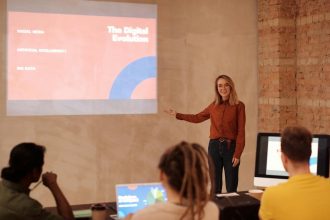AI’s Job Automation Impact: What’s Next?
The rapid advancement of artificial intelligence (AI) is no longer a futuristic concept; it’s a present-day force reshaping the global workforce. As AI technologies become more sophisticated, questions about their impact on employment are at the forefront of discussions. This article dives into the current state of AI’s job automation impact, exploring which sectors are most affected and what lies ahead for professionals navigating this evolving landscape.
Understanding AI’s Role in Workforce Transformation
Artificial intelligence is fundamentally altering how tasks are performed across numerous industries. From automating repetitive processes to enhancing complex decision-making, AI’s capabilities are expanding exponentially. This shift isn’t just about replacing human workers; it’s also about augmenting their abilities and creating new avenues for innovation and efficiency.
Sectors Experiencing Significant AI-Driven Changes
Several key sectors are already witnessing the profound effects of AI integration. Understanding these shifts is crucial for proactive career planning and business strategy.
Manufacturing and Production
Robotics and AI-powered automation are transforming assembly lines, leading to increased precision and output. This often involves the displacement of manual labor in repetitive tasks.
Customer Service
Chatbots and virtual assistants are handling a growing volume of customer inquiries, providing instant support and freeing up human agents for more complex issues.
Data Analysis and Administration
AI algorithms can process and analyze vast datasets far more quickly than humans, impacting roles in data entry, reporting, and administrative support.
Transportation and Logistics
Autonomous vehicles and AI-optimized route planning are set to revolutionize the movement of goods and people, with potential implications for drivers and logistics managers.
Identifying ‘Tech-Proof’ Roles in the Age of AI
While AI is automating many tasks, certain human-centric skills remain indispensable. These roles often require creativity, emotional intelligence, complex problem-solving, and strategic thinking.
Creative Professions
Roles in art, writing, music, and design that rely heavily on original thought and subjective interpretation are generally less susceptible to immediate AI replacement.
Healthcare and Personal Care
Jobs requiring empathy, direct patient interaction, and nuanced medical judgment, such as nurses, doctors, and therapists, are expected to remain in high demand.
Strategic Leadership and Management
High-level decision-making, strategic planning, and team leadership demand a level of foresight and interpersonal skill that AI cannot yet replicate.
Skilled Trades Requiring Dexterity and Problem-Solving
Certain trades, like plumbing, electrical work, and specialized repair, often involve unpredictable environments and require hands-on problem-solving that is difficult for current AI systems.
Strategies for Navigating the AI-Influenced Job Market
Adapting to the evolving job market requires a proactive and continuous learning approach. Here are key strategies to consider:
- Embrace Lifelong Learning: Continuously acquire new skills, particularly those complementary to AI technologies.
- Develop Soft Skills: Focus on enhancing communication, critical thinking, creativity, and emotional intelligence.
- Upskill and Reskill: Explore training programs and certifications that align with emerging AI-driven roles.
- Understand AI Tools: Learn how to leverage AI as a tool to enhance your productivity and effectiveness in your current or future role.
The Future of Work: Collaboration Between Humans and AI
The most likely future of work involves a synergistic relationship between humans and AI. Rather than a complete takeover, AI will likely serve as a powerful assistant, automating routine tasks and providing insights that empower human workers to focus on higher-value activities. This collaborative model promises increased productivity and the creation of entirely new job categories.
Preparing for this future means understanding both the disruptive potential and the collaborative opportunities presented by AI. By focusing on developing uniquely human skills and embracing continuous learning, individuals and organizations can thrive in the evolving landscape.
What are your thoughts on AI’s impact on jobs? Share your insights in the comments below!
Featured image provided by Pexels — photo by Artem Podrez




